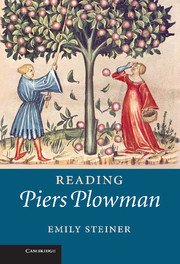4 - Learning
(B.8–12)
Published online by Cambridge University Press: 05 May 2013
Summary
“For we have no lettre of oure lif, how longe it shal dure”
(B.10.91)Introduction
At the end of B.7, Piers receives a pardon from Truth on behalf of the community, and a priest offers to read and interpret it for him. The priest informs Piers that the pardon contains only two lines: those who have done well may look forward to eternal life in heaven, and those who have done evil are destined to eternal fire in hell. Exasperated by the priest or distressed by the pardon, Piers takes it upon himself to gloss this text: he tears the pardon in half and vows to pursue a life of prayer and penance on the model of the apostles: “‘Ne soliciti sitis,’ he seith in the Gospel, / And sheweth us by ensamples us selve to wisse” [“Do not be solicitous,” [Luke] says in the Gospel, / And shows us through examples how we should conduct ourselves] (7.127–8). The priest notes that Piers is educated and asks, “who lerned thee on boke?” (7.132), to which Piers responds with an intellectual autobiography calculated to provoke the priest: Abbess Abstinence taught him his “a.b.c.” and Conscience taught him much more or better (7.136–37). To be literate, by any definition, is to write oneself into a moral life. Although Piers is ostensibly just a plowman, who relies on priests to instruct him in the faith, in fact he has built his miniature allegory from an educated priest’s preaching materials: abbatissa and abstinentia are commonly among the first few entries in alphabetically ordered distinctiones books and concordances, biblical reference books for medieval preachers. The priest mocks the plowman’s pretensions to learning, and he and Piers debate with each other until the dreamer wakes up.
- Type
- Chapter
- Information
- Reading Piers Plowman , pp. 96 - 139Publisher: Cambridge University PressPrint publication year: 2013

